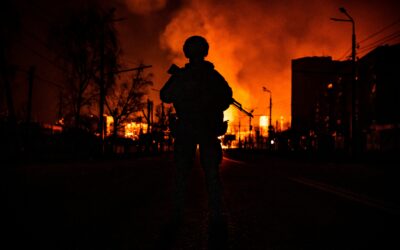
In Future Wars, Drone Weapons With Minds of Their Own
SUBSCRIBER+EXCLUSIVE BRIEFING — Drone weapons are part of the daily narrative of the war in Ukraine – from Russia’s use of Iranian drones against infrastructure […] More
OPINION — President Donald Trump’s decision to remove the small contingent of United States troops remaining in Syria is a disaster on multiple levels. It illustrates not only his reckless instincts on foreign policy but also the near-total absence of a process for making momentous decisions in his administration.
For process, Trump’s style might be called “reverse gear” foreign policy: Make the decision in a tweet or with a tiny group of advisers, throw it out the door, let people — including experienced foreign policy hands — react, then flip-flop if a critical mass of objections appears. The rest of the world is left shaking their heads and wondering: what is U.S. policy and how is it made?
In a normal administration, voices pro and con are sought before making the decision, potential pitfalls and downsides are spelled out, and then the decision is framed. Given Trump’s reverse gear approach, it’s quite possible he will have overturned his decision, given it some mystifying twist or denied he ever made it by the time this article appears — though most of the damage will still have been done. Indeed, Turkish President Recep Tayyip Erdogan announced last Wednesday that Turkish soldiers had crossed the border in an offensive against Kurdish militants once backed by the U.S.
An underlying question for many is: Why should we care about Syria? In my view, it is yet another case in foreign policy in which some far-off, obscure and exotic land turns out to be the fulcrum of larger events even as its immediate significance is shrouded in complexity (the way many Brits other than Churchill doubted the relevance of Czechoslovakia prior to World War II).
Syria only matters if you see merit in maintaining U.S. international leadership and think it matters to keep promises to close allies. On the leadership issue, Syria is the touchstone for America’s reputation in the Middle East, and our policy there will be judged by other countries around the world.
All of the Middle East’s problems intersect in Syria: the Sunni-Shiite split, the Persian-Arab rivalry, the terrorist challenge to regimes, the Israeli-Arab-Persian struggle, the clash between autocracy and reformers (the latter being the origin of the war, as the Bashar Assad regime cracked down violently on Arab Spring demonstrators in 2011–12). To not play in Syria is to say the Middle East doesn’t matter to the U.S. now that we have less need for its oil. Many Americans may be fine with that — but the rest of the world, particularly our closest European and Asian partners, still require influence and stability for their own national security. And they look to American leadership to help ensure that.
Regarding allegiance to allies, backing away from Syria leaves our Kurdish partners exposed to the hostility and likely military attacks of another powerful U.S. NATO ally, Turkey, which regards Syrian Kurds as synonymous with Kurds in Turkey, who have for years been in a violent struggle with the government for greater autonomy. Moreover, anything that weakens the Syrian Kurds will give surviving Islamic State bands a freer hand to regain strength. The Kurds have been our principal instrument for taking down the so-called ISIS territorial caliphate, which once incorporated about a third of Syrian and Iraqi territory. Leaving the Kurds exposed will send a simple yet powerful signal to other U.S. allies: Do not trust pledges from Washington.
Turning to the Islamic State, we know that their remaining fighters have blended into the population and the less governed areas, and that they still hold the potential to surprise us. Pentagon and United Nations estimates put the number of surviving fighters scattered in Syria and Iraq at roughly 20,000 to 30,000, and they have something al-Qaida never had: well-established bases of support in Africa and as far away as Southeast Asia, particularly the Philippines. And the engine, the motivation, for ISIS is still very much alive. The magnetic pull of Sunni grievances, which once had foreign fighters flowing into Syria at a rate of 1,000 people a month, has not been resolved.
ISIS has been damaged and degraded but has not yet been defeated. Weakening the Kurds will clear part of the path for its renewal.
Finally, pulling further away from Syria strengthens Iran, therefore clashing with Trump’s stated policy of weakening Iran. Tehran has invested treasure and lives in Syria — it claims to have lost more than 2,000 soldiers and suffered 9,000 casualties there — and Israel claims that Iran is building missile factories there.
Russia, meanwhile, remains heavily present; accurate estimates of its strength in Syria are hard to come by, but Moscow claims to have rotated 63,000 troops through the country since its intervention began in 2015.
The bottom line: If Trump’s policy holds, it means the U.S. will surrender most of its influence in resolving what many countries see as the key political, military and humanitarian conflict of this decade. The kingmakers will be U.S. rivals Russia and Iran, working with a wandering U.S. ally, Turkey. For many close U.S. friends, the world will seem to have turned upside down.
Former CIA Deputy Director John McLaughlin is a Cipher Brief Expert. His column first appeared in Ozy, where McLaughlin is a regular contributor.
Read more expert national security insights, analysis and perspectives in The Cipher Brief.
Related Articles

SUBSCRIBER+EXCLUSIVE BRIEFING — Drone weapons are part of the daily narrative of the war in Ukraine – from Russia’s use of Iranian drones against infrastructure […] More

SUBSCRIBER+ EXCLUSIVE ANALYSIS — Iran’s retaliatory strikes against Israel this weekend were both a potentially game-changing, historic first — and an underwhelming response. Historic, because […] More

SUBSCRIBER+EXCLUSIVE INTERVIEW — Ukraine was hit by a fresh round of Russian missile attacks on Thursday, strikes that targeted and damaged the country’s power grid […] More

SUBSCRIBER+ EXCLUSIVE REPORTING — The Israeli drone strike that killed three adult sons (who Israel says were Hamas operatives) and four grandchildren of Hamas’s Qatar-based […] More

BOTTOM LINE UP FRONT – In the spring of 2022, Ukraine beat back a Russian assault on the nation’s capital and punished the invaders on […] More

SUBSCRIBER+EXCLUSIVE — The Ukraine war has reached a “pivotal moment,” a “critical stage,” an “inflection point“ – all phrases used to describe the current situation […] More
Search